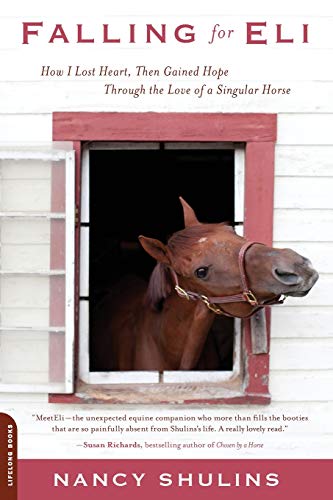Falling for Eli: How I Lost Heart, Then Gained Hope Through the Love of a Singular Horse

“Men and women who have shared the infertility experience will find words that speak for them and to them in this book. People for whom preventing conception is the issue, however, may find the depth and duration of Ms. Shulins’ grief incomprehensible.”
Falling for Eli is a smoothly written book that reflects the talent and skill Ms. Shulins honed during a career writing for the Associated Press. Whether her memoir works for you will depend on your feelings about horses, infertility, grief, and insecurity, because the author shares her feelings on these subjects in prose that brings them uncomfortably alive.
The Eli of title is a horse that substitutes for the child the author cannot have. Thus, we learn about the horse equivalent of diapers and first steps, scary illnesses, and schooling in detail that’s nonetheless fascinating in that for most of us equine life is strange and unknown.
For readers well acquainted with horses, those details will be beloved in their familiarity. As a reporter, Ms. Shulins knows how to get her facts straight, so her story is educational as well as anecdotal. Although she spent time riding in her youth, she comes back to it in mid-adulthood after a lifestyle change from city to suburbs.
Owning her own horse becomes a voyage of discovery and a challenge worthy of distracting her, productively, from a long period of grief over barrenness.
Men and women who have shared the infertility experience will find words that speak for them and to them in this book. People for whom preventing conception is the issue, however, may find the depth and duration of Ms. Shulins’ grief incomprehensible.
But almost everyone understands insecurity, which enables readers to relate to the author’s doubts and fears as she delves into a new life. She displays inspiring courage by publicly stripping her soul bare through this book—a testament to the healing process allowed by both loving another being and writing it all out.
Were this memoir a novel, the main character would grow and change on a predictable arc and be cured of her insecurities by the end. Instead, Ms. Shulins’ is a real-life story, so we must ride with her at her own pace over her own obstacles, and reflect on how they parallel our own.
Her horse, Eli, helps her reinvent herself over more than a decade. So do an assortment of likeable and despicable characters who populate the stables where Ms. Shulins boards and trains. Along with equine lore, she informs us about dressage as a school of equitation. At times her training feels like boot camp, though as often happens in that harsh environment, the student is forged into a better, stronger person. We don’t learn much about the Eli’s growth during training, which would enhance the book’s appeal to horse lovers.
Eli is presented as a complete entity, not just a riding vehicle. He has all the personality depth and range of a child, easily fulfilling Ms. Shulin’s need to nurture, yet she never romanticizes or anthropomorphizes him. Rather, she shows keen understanding of equine mentality through her realistic portrayal of his behavior. She does the same with people, too, making Falling for Eli an insightful portrait of both woman and animal.
She leaves us with the belief that her new life will go on—always growing better. Hopefully she will publish a follow-up story some years down the road and let us know how everything worked out.